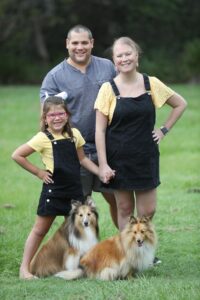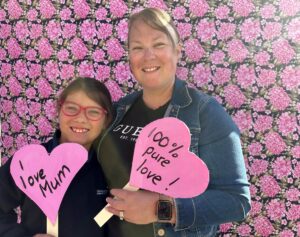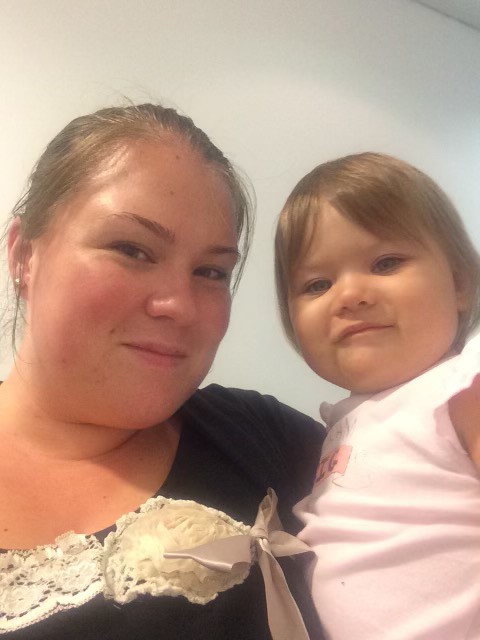On a cold winter day in 2008, Kate McKenzie, who had just celebrated her 20th birthday, was walking back to her office in Brisbane after a doctor’s appointment.
She was having bowel issues at the time and needed a referral for a colonoscopyan examination of the large intestine/bowel with a small, flexible instrument known as a colonoscope.
As she rushed through the city crowds, she looked down at the referral and read something that terrified her.
“I remember seeing my mum’s history mentioned on it. I knew something similar would be on the cards for me,” she tells 9Honey Parenting.
Fast forward 15 years and Kate is now in palliative carea variety of practices and exercises used to provide pain relief and improve quality of life without curing the disease, diagnosed with the same condition her mother Wendy died of just six months after giving birth to her.
Familial Adenomatous Polyposis is a rare inherited cancera disease where abnormal cells split without control and spread to other nearby body tissue and/or organs characterised by hundreds to thousands of precancerous polyps.
Not only is Kate battling the disease, but it’s also present in her nine-year-old daughter Lucia.
“We have time on our side, and I’m optimistic that she will have options by the time she’s a young woman,” Kate says, remaining positive about her daughter’s fight against the cancer that has attacked three generations of her family.
Reflecting on her battle over the past 15 years, Kate says she has always known there was a riskthe possibility that something bad will happen she would develop the condition that led to her losing her mother so early in her life.
 Kate’s daughter Lucia also has the same cancer-causing gene. (Supplied)
Kate’s daughter Lucia also has the same cancer-causing gene. (Supplied)
So when she began to develop bowelportion of the digestive system that digests food (small bowel) and absorbs salts and water (large bowel); also called intestines issues in her late teens, she immediately sought medical attention.
“I suspected I might have a problem,” she recalls.
The results from Kate’s endoscopya procedure that involves inserting a long, flexible tube with a light and small camera (endoscope) into the body to view internal organs and colonoscopy confirmed her suspicion.
“The investigations from my gastroenterologist showed thousands of polyps, and how big they were. They were not able to be operated on, but I had to have my colonthe longest portion of the large bowel that absorbs water and salts from ingested food removed.”
Five years after that procedure, Kate and her husband Brendon received an incredible gift in the midst of her health battle she fell pregnant with daughter Lucia.
However, that gift also caused a turn for the worse in her condition.
 Kate and Lucia are incredibly close. (Supplied)
Kate and Lucia are incredibly close. (Supplied)
“That’s when I developed my first Desmoid Tumoura tissue mass that forms from groups of unhealthy cells, just like my mum. These tumours feed off the hormones released during pregnancy, it’s almost like a type of fuel,” Kate says.
“It was a very rough pregnancy. The biggest thing we were worried about was not exploding my bowel, so I needed a c-section.”
Despite these difficulties, Lucia was born four weeks early in 2013. Then, while Kate was enjoying her miracle baby, she was hit with a series of further blows.
“I then developed brain cancer when she was 14-15 months old. A few years later, we worked out I had Gardner Syndrome,” she says.
Gardner Syndrome is an inherited condition, where people develop hundreds or thousands of abnormal growths in their intestinesportion of the digestive system that digests food (small intestine) and absorbs salts and water (large intestine), also called bowel.
Kate had now been diagnosed with two genetic conditions that caused cancerous growths. Her worst nightmare as a mother was that Lucia would inherit them.
That nightmare became her reality when tests indicated Lucia, at seven years old, had the same conditions.
“She has little indications of it here and there, but at this point there’s nothing much we can do. We just need to sit and watch and waitthe close monitoring of a cancer without giving treatment until symptoms appear or worsen,” Kate says.
“The difference is, now that I’ve been through this, we know more about how to manage it, even though we can’t cureno evidence of disease; complete cancer remission it. My history is carving a path of possibilities for her treatment in the future.”
Her main aim now is to support Lucia and be there for her no matter what – something Kate didn’t have growing up.
“I didn’t have a mother to talk to about this when I was young. That’s the most important thing to me,” she says.
“We have a very strong relationship, and she knows I am here for her. Oftentimes she’s there for me too; she’s such a sweet and caring girl.”
All the while, Kate continues to fight her own personal battle.
“There is no surgerytreatment involving removal of cancerous tissue and/or tumours and a margin of healthy tissue around it to reduce recurrence option for me. We’re just trying to keep the tumours at bay and not do anything that will flare them up, or ‘wake the cranky bear’, as we call it in our family.”
Though while there is no cure for Kate, she isn’t letting that get in the way of her living her life.
“The world doesn’t stop, and you need to set an example for your children. If I sat and dwelled on my situation I’d get nowhere. You need a reason to get up every day.”
Kate continues to work in allied health for the Queensland government, ensuring she is giving back to her community and doing something good for others.
“The world can be a scary place, but everyone can contribute something.”
June is National Rare Cancers Awareness Month – Rare Cancers Australia is determined to ensure no rare cancer patient is forgotten or ignored again.
Rare Cancers is calling on the public to help raise funds to give more Australians access to vital rare cancer support.
Published on 9Honey on 23 June 2023 as ‘35 years after her mum died, Kate and her daughter are battling the same cancer’.
